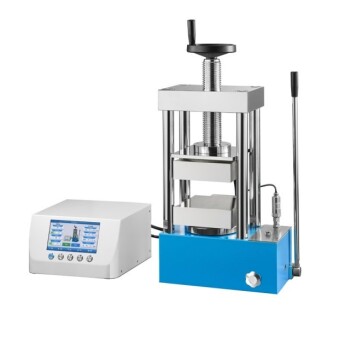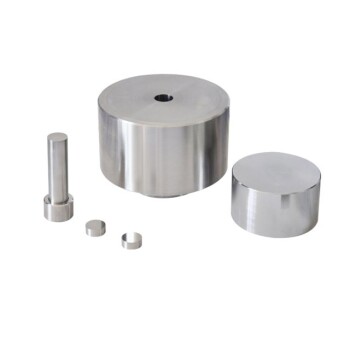At its core, a heated hydraulic press is a laboratory instrument used for two primary functions: to test the mechanical properties of materials under specific conditions and to prepare highly uniform samples for subsequent analytical measurement. By precisely combining high force with controlled temperature, these presses allow researchers to simulate demanding environments and create ideal specimens for techniques like spectroscopy.
The true value of a heated hydraulic press lies in its ability to eliminate variables. By applying both heat and pressure, it transforms inconsistent powders or materials into perfectly uniform, dense samples, ensuring that subsequent analytical results are accurate, repeatable, and free from artifacts caused by physical imperfections.

The Core Functions: Testing and Preparation
Heated hydraulic presses serve a dual role in a research or quality control environment. They can be the primary testing instrument or a critical preparatory step for other analyses.
Simulating Extreme Conditions for Material Testing
Researchers use heated presses to understand how a material will behave under stress. The combination of thermal and mechanical force simulates real-world manufacturing processes or harsh operational environments.
This allows for the direct measurement of properties like strength, durability, and deformation. For instance, a press can be used to test the "blocking resistance" of flexible packaging films, determining if they will stick to themselves under the pressure and heat of a warehouse.
Creating Homogeneous Samples for Analysis
Many advanced analytical techniques require a sample that is perfectly flat, dense, and chemically uniform. Heated presses are the ideal tool for creating these samples from powders or other source materials.
This is especially critical for methods like X-Ray Fluorescence (XRF) and Fourier-Transform Infrared (FTIR) spectroscopy. The press compacts loose powder into a solid, stable pellet or a thin film with consistent density.
Why Homogeneity is Critical for Spectroscopy
In spectroscopy, the instrument's beam interacts with the sample's surface. If that surface is uneven or has voids, the signal can be scattered unpredictably, leading to inaccurate results.
Compacting a sample into a dense pellet using a heated press minimizes these "matrix effects." It ensures the measurement is representative of the entire material, not just a localized surface flaw, which is essential for obtaining reliable quantitative data on elemental or molecular composition.
How Heat and Pressure Work in Tandem
The power of this technique comes from the synergy between hydraulic force and controlled heating. Each element plays a distinct and complementary role in creating the ideal sample.
The Role of Pressure: Achieving Uniform Density
The hydraulic system delivers immense, evenly distributed force. This pressure compacts the sample material, physically forcing particles together and eliminating air pockets or voids.
The result is a sample of consistent density and a perfectly flat surface, which is the foundational requirement for many analytical methods that are sensitive to surface topology.
The Role of Heat: Enhancing Malleability and Bonding
Applying heat lowers a material's viscosity and can increase its malleability. This allows particles to soften and flow, filling microscopic gaps that pressure alone cannot close.
For many polymers and powders, heat helps particles bind together, creating a durable, non-friable pellet that is easy to handle and stable enough for analysis without crumbling.
Understanding the Trade-offs and Considerations
While incredibly powerful, a heated press is not a universal solution. Its effective use requires careful consideration of the material properties and process parameters.
Risk of Thermal Degradation
The most significant limitation is the sample's thermal stability. Applying heat to a thermally sensitive material can cause it to decompose, melt, or undergo a chemical change, rendering the sample useless for its intended analysis. It is crucial to know your material's degradation temperature before applying heat.
Parameter Optimization is Key
Achieving a perfect sample is not automatic. The process requires careful optimization of three key variables: temperature, pressure, and dwell time. Incorrect parameters can result in cracked pellets, incomplete bonding, or thermal damage. Each new material type requires its own validated preparation method.
Equipment and Safety Protocols
Operating a high-pressure, high-temperature system demands rigorous safety protocols. Proper training, routine maintenance, and awareness of the potential hazards are non-negotiable for ensuring safe and reliable operation in any laboratory environment.
Making the Right Choice for Your Goal
To leverage a heated press effectively, align your methodology with your ultimate objective. Your goal determines which aspect of the process you need to prioritize.
- If your primary focus is material property testing: Your goal is to accurately simulate specific conditions to measure the material's response, such as its ultimate tensile strength or compression limits.
- If your primary focus is sample preparation for spectroscopy (XRF, FTIR): Your goal is to achieve maximum sample homogeneity and density to ensure analytical data is accurate and repeatable.
- If your primary focus is developing new composite materials: Your goal is to use the press to explore how different components bond and behave under combined thermal and mechanical stress, optimizing both the material and the formation process.
By mastering its application, you transform sample preparation from a potential source of error into a cornerstone of reliable and insightful data.
Summary Table:
| Function | Key Benefits | Common Applications |
|---|---|---|
| Material Testing | Simulates extreme conditions, measures strength and durability | Testing packaging films, composite materials |
| Sample Preparation | Creates uniform, dense samples for accurate analysis | XRF, FTIR spectroscopy, pellet formation |
| Heat and Pressure Synergy | Enhances malleability, eliminates voids, ensures homogeneity | Polymer bonding, powder compaction |
Ready to elevate your laboratory's capabilities? KINTEK specializes in high-performance lab press machines, including automatic, isostatic, and heated hydraulic presses, designed to meet the rigorous demands of material testing and sample preparation. Our equipment ensures precise temperature control, uniform pressure application, and reliable results for industries like research, quality control, and spectroscopy. Don't let inconsistent samples hold you back—contact us today to discover how KINTEK can optimize your processes and deliver superior outcomes!
Visual Guide

Related Products
- Automatic Heated Hydraulic Press Machine with Hot Plates for Laboratory
- Automatic High Temperature Heated Hydraulic Press Machine with Heated Plates for Lab
- Automatic Heated Hydraulic Press Machine with Heated Plates for Laboratory
- 24T 30T 60T Heated Hydraulic Lab Press Machine with Hot Plates for Laboratory
- Laboratory Hydraulic Press 2T Lab Pellet Press for KBR FTIR
People Also Ask
- How is the temperature of the hot plate controlled in a hydraulic lab press? Achieve Thermal Precision (20°C-200°C)
- Why is it necessary to use heating equipment for the dewatering of hempseed oil biodiesel? Expert Quality Guide
- How is a heated hydraulic press used in material testing and research? Unlock Precision in Material Analysis
- What are the industrial applications of a hydraulic heat press? Powering Lamination, Bonding, and R&D Efficiency
- What are the key technical requirements for a hot press machine? Mastering Pressure and Thermal Precision



















